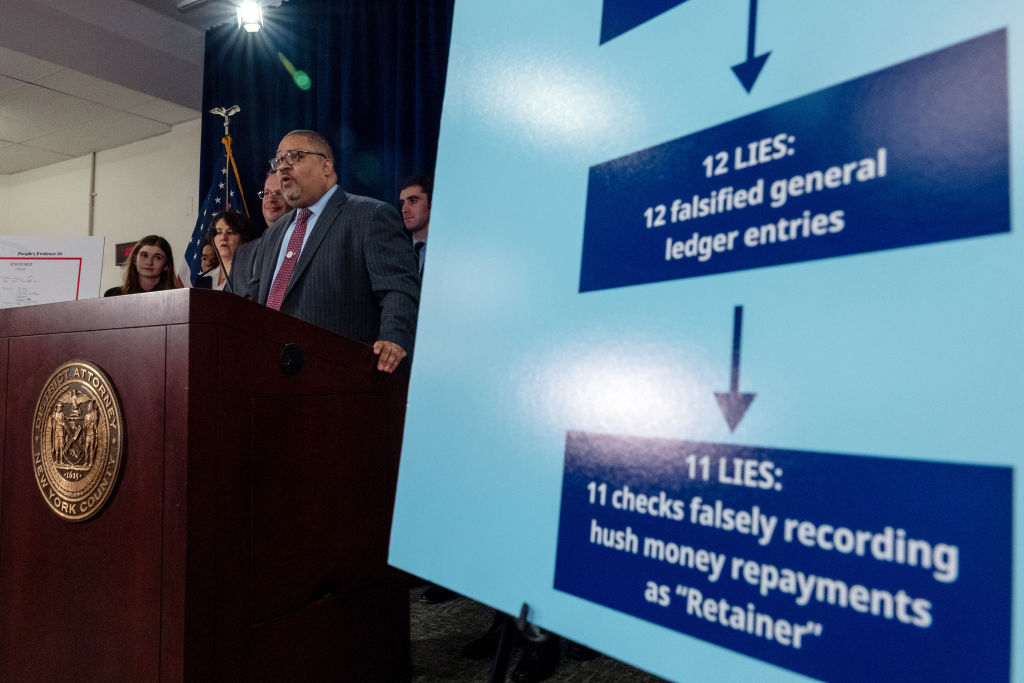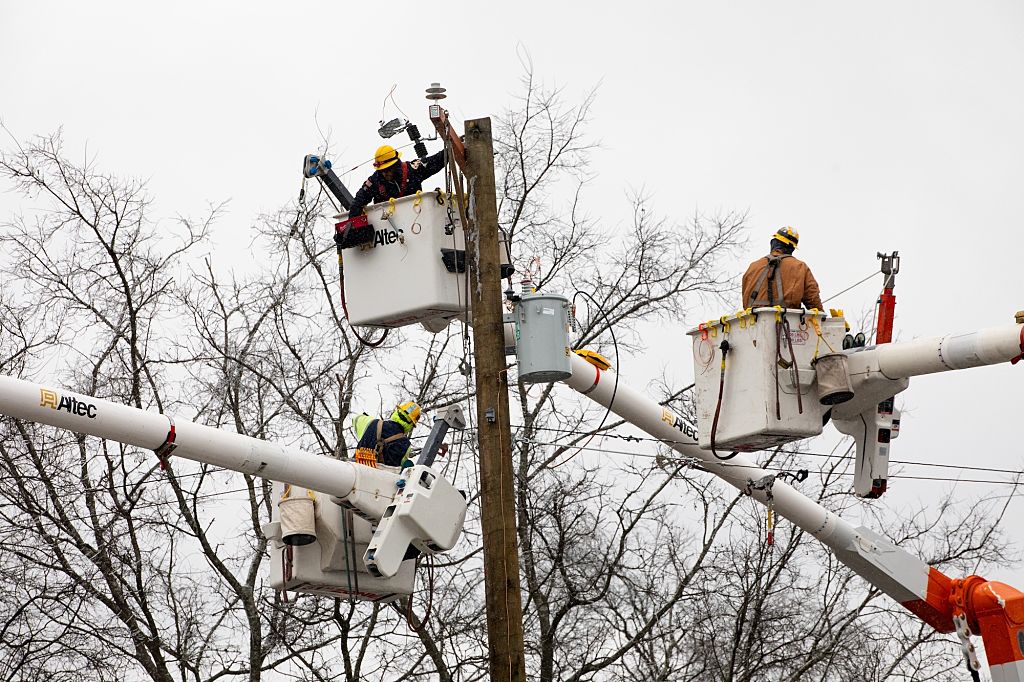SCOTUS Immunity Ruling Spotlights Alvin Bragg Convicting Trump
SCOTUS Immunity Decision Underscores The Significance Of Trump’s Hush Money Conviction

Manhattan District Attorney Alvin Bragg stands with members of his staff at a news conference following the conviction of Donald Trump in his hush money trial on May 30, 2024, in New York City. | Source: Spencer Platt / Getty
On Monday, the U.S. Supreme Court ruled that Donald Trump has “presumptive immunity” for acts he performed while he was the sitting president. The justices didn’t rule Trump had the “total immunity” that he has repeatedly said all presidents should have—despite having called for the prosecutions of President Joe Biden and Barack Obama for ambiguous “crimes” neither he nor any other Republican has been able to define—but they did issue a ruling that really seems to give Trump and future presidents a lot of wiggle room to be criminals-in-chief while in office without being held accountable for it. The ruling also “effectively erases any chance that the high-profile criminal case against the presumptive Republican presidential nominee will head to trial before the Nov. 5 election,” according to CNBC, which also casts doubt on the notion of any charges sticking to Trump outside of the 34 felonies he has already been convicted of.
In other words: The Supreme Court might just have ensured that Manhattan District Attorney Alvin Bragg will be the only officer of the court to successfully hold Trump criminally responsible for anything.
In the 6-3 decision, which sends the case back to U.S. District Judge Tanya Chutkan, the court did rule that Trump is not immune for “unofficial acts” and that “not everything the President does is official.” CNBC noted that the decision doesn’t kell special counsel Jack Smith’s election interference case against the former president, but the language in the ruling certainly fails to do much in the way of making it clear which acts Trump can and can’t be prosecuted for.
From CNBC:
“The President is not above the law,” Chief Justice John Roberts wrote for the majority.
“But Congress may not criminalize the President’s conduct in carrying out the responsibilities of the Executive Branch under the Constitution,” Roberts ruled.
That means the president is “absolutely immune from criminal prosecution for conduct within his exclusive sphere of constitutional authority,” Roberts wrote.
That covers actions such as granting pardons or removing presidentially appointed executive officers, he wrote.
The president also enjoys “at least a presumptive immunity from criminal prosecution” for acts performed “within the outer perimeter of his official responsibility,” the majority concluded.
That standard “is required to safeguard the independence and effective functioning of the Executive Branch,” the chief justice explained.
In practice, that means that the president is immune from prosecution “unless the Government can show that applying a criminal prohibition to that act would pose no ‘dangers of intrusion on the authority and functions of the Executive Branch,’” Roberts wrote.
Look, I’m no legal expert or anything, but it really seems like Roberts is saying that even if the government can prove Trump did something illegal while in office, he can only be prosecuted for said illegal activity if the government can also prove that prosecuting Trump won’t get in the way of business as usual at the Executive Branch. Again, it just seems like a ruling that vague will give Trump and any other person who sits in the Oval Office a lot of rope to commit crimes and essentially say, “Yeah, I did it, but you can’t arrest me because I’m president and I’m trying to work over here!”
Like in most Supreme Court cases involving Trump, it was the three Democratic justices, Ketanji Brown Jackson, Elena Kagan and Sonia Sotomayor, who dissented.
“This majority’s project will have disastrous consequences for the Presidency and for our democracy,” Sotomayor wrote in her dissent. “The relationship between the President and the people he serves has shifted irrevocably. In every use of official power, the President is now a king above the law.”
“When he uses his official powers in any way, under the majority’s reasoning, he now will be insulated from criminal prosecution,” Sotomayor continued. “Orders the Navy’s Seal Team 6 to assassinate a political rival? Immune. Organizes a military coup to hold onto power? Immune. Takes a bribe in exchange for a pardon? Immune. Immune, immune, immune. With fear for our democracy, I dissent.”
Biden’s campaign shared a statement rightfully noting that, while serving as president, Trump responded to losing his bid for re-election in 2020 by throwing an extended temper tantrum and embarking on a false election fraud propaganda campaign that inspired an act of domestic terrorism at the U.S. Capitol.
“Today’s ruling doesn’t change the facts, so let’s be very clear about what happened on January 6: Donald Trump snapped after he lost the 2020 election and encouraged a mob to overthrow the results of a free and fair election. Trump is already running for president as a convicted felon for the very same reason he sat idly by while the mob violently attacked the Capitol: he thinks he’s above the law and is willing to do anything to gain and hold onto power for himself.
“Since January 6, Trump has only grown more unhinged. He’s promising to be a dictator ‘on day one,’ calling for our Constitution to be ‘terminated’ so he can regain power, and promising a “bloodbath” if he loses. The American people already rejected Donald Trump’s self-obsessed quest for power once – Joe Biden will make sure they reject it for good in November.”
The Biden campaign isn’t wrong about any of that, of course. Meanwhile, Trump responded to the ruling by taking to his Truth Social platform to call it a “BIG WIN FOR OUR CONSTITUTION AND DEMOCRACY,” as if he didn’t try to cancel democracy just a few short years ago.








